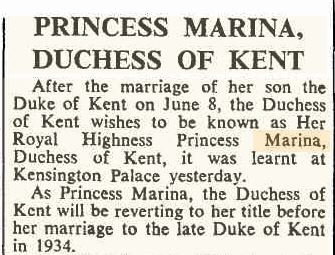Helena seemingly would have remained a princess of Waldeck and Pyrmont, as
the declaration of King George V by which the royal family relinquished its German titles covered only descendants of Queen Victoria who were British subjects. She was a British subject by marriage, but not a descendant of Queen Victoria, unless the British definition of "descendant" includes in-laws.
(Note that whereas George V's declaration concerning the family name of Windsor affected only
male-line descendants of Queen Victoria who were British subjects, the relinquishment of German titles affected
all descendants of Queen Victoria who were British subjects.)
Now, therefore, We, out of Our Royal Will and Authority, do hereby declare and announce that as from the date of this Our Royal Proclamation Our House and Family shall be styled and known as the House and Family of Windsor, and that all the descendants in the male line of Our said Grandmother Queen Victoria who are subjects of these Realms, other than female descendants who may marry or may have married, shall bear the said Name of Windsor:
And do hereby further declare and announce that We for Ourselves and for and on behalf of Our descendants and all other the descendants of Our said Grandmother Queen Victoria who are subjects of these Realms, relinquish and enjoin the discontinuance of the use of the Degrees, Styles, Dignities, Titles and Honours of Dukes and Duchesses of Saxony and Princes and Princesses of Saxe-Coburg and Gotha, and all other German Degrees, Styles, Dignities. Titles, Honours and Appellations to Us or to them heretofore belonging or appertaining.



 Thanks! Is it clear whether "As Princess Marina, the Duchess of Kent will be reverting to her title before her marriage" was how it was put by Kensington Palace, or merely the assumption of The Times' reporter? I would have thought the "Princess" would refer to her British title, not her Greek one.
Thanks! Is it clear whether "As Princess Marina, the Duchess of Kent will be reverting to her title before her marriage" was how it was put by Kensington Palace, or merely the assumption of The Times' reporter? I would have thought the "Princess" would refer to her British title, not her Greek one.